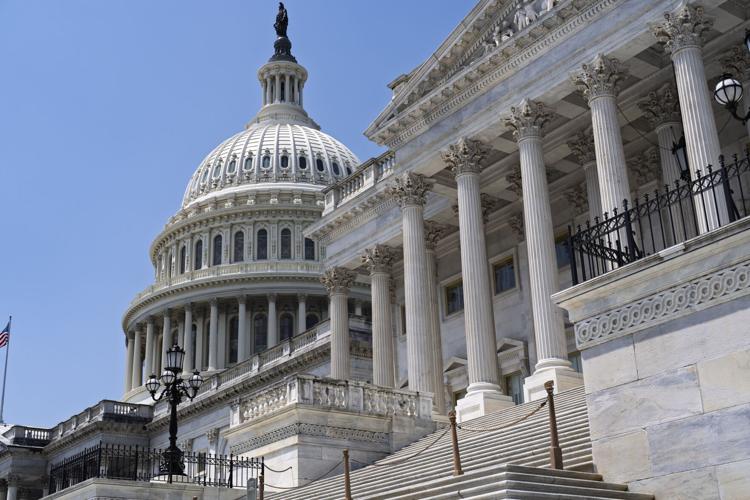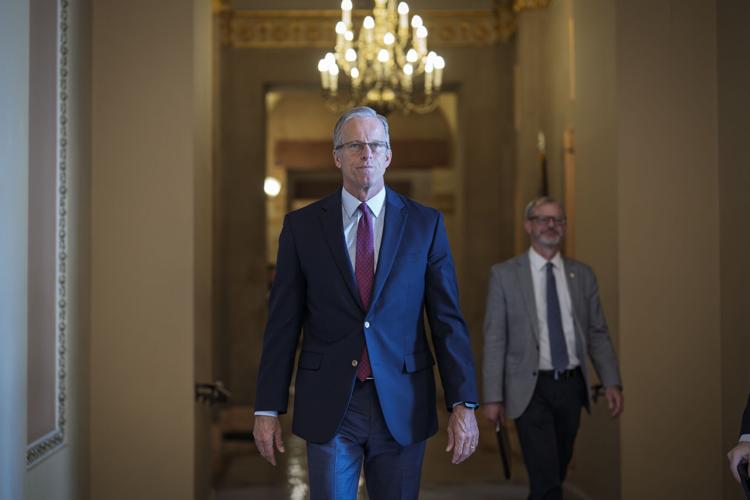WASHINGTON — The Senate's long day of voting churned toward evening Monday, with Republican leaders grasping for ways to shore up support for President Donald Trump's bill of tax breaks and spending cuts while fending off proposed amendments from Democrats who oppose the package and are trying to defeat it.
The outcome was not yet in sight. Senate Majority Leader John Thune of South Dakota acknowledged the Republicans are “figuring out how to get to the end game.”
And House Speaker Mike Johnson signaled the potential problems the Senate package could face when it is eventually sent back to his chamber for a final round of voting, which was expected later this week, ahead of Trump's July 4 deadline.
“I have prevailed upon my Senate colleagues to please, please, please keep it as close to the House product as possible,” said Johnson, the Louisiana Republican, as he left the Capitol around dinnertime.
People are also reading…
It's a pivotal moment for the Republicans, who have control of Congress and are racing to wrap up work with just days to go before Trump's holiday deadline Friday. The 940-page “One Big Beautiful Bill Act,” as it’s formally titled, has consumed Congress as its shared priority with the president, with no room politically to fail, even as not all Republicans are on board.
The GOP leaders have no room to spare, with narrow majorities in both chambers. Thune can lose no more than three Republican senators, and already two — Sen. Thom Tillis of North Carolina, who warns people will lose access to Medicaid health care, and Sen. Rand Paul of Kentucky, who worries the tax breaks will pile onto debt — have indicated they will vote no.
Tillis abruptly announced over the weekend he would not seek reelection after Trump threated to campaign against him.
Ahead of Monday's voting Senate Democratic Leader Chuck Schumer of New York said the “hardest choices” for Republicans are still to come.
“With every rewrite Senate Republicans have made their bill more extreme,” Schumer said. “All to give tax breaks to billionaires.”
Democrats have proposed dozens of amendments in what’s called a vote-a-rama, though most are expected to fail. Democrats are united against the Republican president's legislation and eagerly lined up to challenge it.
A new analysis from the nonpartisan Congressional Budget Office found 11.8 million more Americans would become uninsured by 2034 if the bill became law. The CBO said the package would increase the deficit by nearly $3.3 trillion over the decade.
The White House said it was counting on Republican lawmakers to "get the job done.”
“Republicans need to stay tough and unified during the home stretch,” White House press secretary Karoline Leavitt said.
But after nine hours of voting, it was slow going, another sign that Republican leaders were not yet ready to call for final passage.
Few Republicans appear fully satisfied as the final package emerges, in either the House or Senate.
Tillis said it is a betrayal of the president's promises not to kick people off health care, especially if rural hospitals close.
At the same time, some loosely aligned conservative Senate Republicans — Rick Scott of Florida, Mike Lee of Utah, Ron Johnson of Wisconsin and Cynthia Lummis of Wyoming — have proposed steeper cuts, particularly to health care. That drew their own warning from Trump not to go “crazy."
As the first few Senate amendments came up Monday — to strike parts of the bill that would limit Medicaid funds to rural hospitals or shift the costs of food stamp benefits to the states — some were winning support from a few Republicans.
Sen. Susan Collins, R-Maine, joined Democrats on the rural hospitals amendment, and Sen. Lisa Murkowski, R-Alaska, joined Democrats on both votes.
None of the amendments so far has won majority support to substantially change the package.
But Collins is pressing for more aid for rural hospitals and Murkowski secured provisions to spare Alaskans from some of the steep health care and food stamp cuts. They have not said how they will vote for the final package.
Sen. Mike Crapo, the GOP chairman of the Finance Committee, dismissed the dire predictions of health care cuts as Democrats trafficking in what he called the “politics of fear.”
All told, the Senate bill includes $4.5 trillion in tax cuts, according to the latest CBO analysis, making permanent Trump's 2017 rates, which would expire at the end of the year if Congress fails to act, while adding the new ones he campaigned on, including no taxes on tips.
The Senate package would roll back billions of dollars in green energy tax credits, which Democrats warn will wipe out wind and solar investments nationwide. It would impose $1.2 trillion in cuts, largely to Medicaid and food stamps, by imposing work requirements, making sign-up eligibility more stringent and changing federal reimbursements to states.
Additionally, the bill would provide a $350 billion infusion for border and national security, including for deportations, some of it paid for with new fees charged to immigrants.
Unable to stop the march toward passage, the Democrats as the minority party in Congress are using the tools at their disposal to delay and drag out the process.
Democrats forced a full reading of the text, which took 16 hours, and they have a stream of amendments.
Sen. Patty Murray of Washington, the ranking Democrat on the Appropriations Committee, raised particular concern at the start of debate late Sunday about the accounting method being used by the Republicans, which says the tax breaks from Trump's first term are now “current policy” and the cost of extending them should not be counted toward deficits.
“In my 33 years here in the United States Senate, things have never — never — worked this way,” said Murray, the longest-serving Democrat on the Budget Committee.
She said that kind of “magic math” won't fly with Americans trying to balance their own household books.
“Go back home,” she said, “and try that game with your constituents.”



















